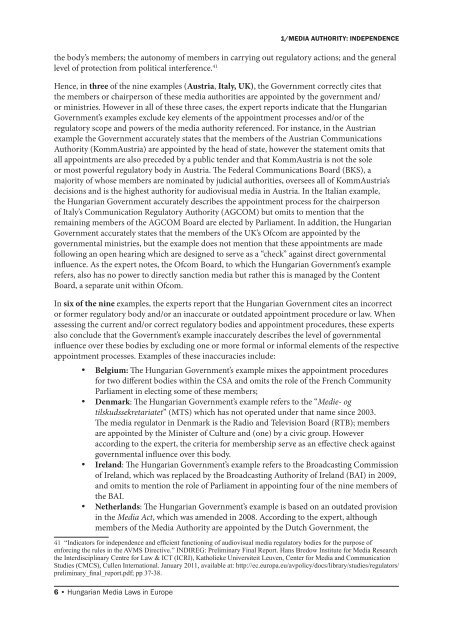An Assessment of the Consistency of Hungary's Media Laws with ...
An Assessment of the Consistency of Hungary's Media Laws with ...
An Assessment of the Consistency of Hungary's Media Laws with ...
Create successful ePaper yourself
Turn your PDF publications into a flip-book with our unique Google optimized e-Paper software.
6 • Hungarian <strong>Media</strong> <strong>Laws</strong> in Europe<br />
1/<strong>Media</strong> authority: independence<br />
<strong>the</strong> body’s members; <strong>the</strong> autonomy <strong>of</strong> members in carrying out regulatory actions; and <strong>the</strong> general<br />
level <strong>of</strong> protection from political interference. 41<br />
Hence, in three <strong>of</strong> <strong>the</strong> nine examples (Austria, Italy, UK), <strong>the</strong> Government correctly cites that<br />
<strong>the</strong> members or chairperson <strong>of</strong> <strong>the</strong>se media authorities are appointed by <strong>the</strong> government and/<br />
or ministries. However in all <strong>of</strong> <strong>the</strong>se three cases, <strong>the</strong> expert reports indicate that <strong>the</strong> Hungarian<br />
Government’s examples exclude key elements <strong>of</strong> <strong>the</strong> appointment processes and/or <strong>of</strong> <strong>the</strong><br />
regulatory scope and powers <strong>of</strong> <strong>the</strong> media authority referenced. For instance, in <strong>the</strong> Austrian<br />
example <strong>the</strong> Government accurately states that <strong>the</strong> members <strong>of</strong> <strong>the</strong> Austrian Communications<br />
Authority (KommAustria) are appointed by <strong>the</strong> head <strong>of</strong> state, however <strong>the</strong> statement omits that<br />
all appointments are also preceded by a public tender and that KommAustria is not <strong>the</strong> sole<br />
or most powerful regulatory body in Austria. The Federal Communications Board (BKS), a<br />
majority <strong>of</strong> whose members are nominated by judicial authorities, oversees all <strong>of</strong> KommAustria’s<br />
decisions and is <strong>the</strong> highest authority for audiovisual media in Austria. In <strong>the</strong> Italian example,<br />
<strong>the</strong> Hungarian Government accurately describes <strong>the</strong> appointment process for <strong>the</strong> chairperson<br />
<strong>of</strong> Italy’s Communication Regulatory Authority (AGCOM) but omits to mention that <strong>the</strong><br />
remaining members <strong>of</strong> <strong>the</strong> AGCOM Board are elected by Parliament. In addition, <strong>the</strong> Hungarian<br />
Government accurately states that <strong>the</strong> members <strong>of</strong> <strong>the</strong> UK’s Ofcom are appointed by <strong>the</strong><br />
governmental ministries, but <strong>the</strong> example does not mention that <strong>the</strong>se appointments are made<br />
following an open hearing which are designed to serve as a “check” against direct governmental<br />
influence. As <strong>the</strong> expert notes, <strong>the</strong> Ofcom Board, to which <strong>the</strong> Hungarian Government’s example<br />
refers, also has no power to directly sanction media but ra<strong>the</strong>r this is managed by <strong>the</strong> Content<br />
Board, a separate unit <strong>with</strong>in Ofcom.<br />
In six <strong>of</strong> <strong>the</strong> nine examples, <strong>the</strong> experts report that <strong>the</strong> Hungarian Government cites an incorrect<br />
or former regulatory body and/or an inaccurate or outdated appointment procedure or law. When<br />
assessing <strong>the</strong> current and/or correct regulatory bodies and appointment procedures, <strong>the</strong>se experts<br />
also conclude that <strong>the</strong> Government’s example inaccurately describes <strong>the</strong> level <strong>of</strong> governmental<br />
influence over <strong>the</strong>se bodies by excluding one or more formal or informal elements <strong>of</strong> <strong>the</strong> respective<br />
appointment processes. Examples <strong>of</strong> <strong>the</strong>se inaccuracies include:<br />
• Belgium: The Hungarian Government’s example mixes <strong>the</strong> appointment procedures<br />
for two different bodies <strong>with</strong>in <strong>the</strong> CSA and omits <strong>the</strong> role <strong>of</strong> <strong>the</strong> French Community<br />
Parliament in electing some <strong>of</strong> <strong>the</strong>se members;<br />
• Denmark:<br />
The Hungarian Government’s example refers to <strong>the</strong> “Medie- og<br />
tilskudssekretariatet” (MTS) which has not operated under that name since 2003.<br />
The media regulator in Denmark is <strong>the</strong> Radio and Television Board (RTB); members<br />
are appointed by <strong>the</strong> Minister <strong>of</strong> Culture and (one) by a civic group. However<br />
according to <strong>the</strong> expert, <strong>the</strong> criteria for membership serve as an effective check against<br />
governmental influence over this body.<br />
• Ireland:<br />
The Hungarian Government’s example refers to <strong>the</strong> Broadcasting Commission<br />
<strong>of</strong> Ireland, which was replaced by <strong>the</strong> Broadcasting Authority <strong>of</strong> Ireland (BAI) in 2009,<br />
and omits to mention <strong>the</strong> role <strong>of</strong> Parliament in appointing four <strong>of</strong> <strong>the</strong> nine members <strong>of</strong><br />
<strong>the</strong> BAI.<br />
• Ne<strong>the</strong>rlands:<br />
The Hungarian Government’s example is based on an outdated provision<br />
in <strong>the</strong> <strong>Media</strong> Act, which was amended in 2008. According to <strong>the</strong> expert, although<br />
members <strong>of</strong> <strong>the</strong> <strong>Media</strong> Authority are appointed by <strong>the</strong> Dutch Government, <strong>the</strong><br />
41 “Indicators for independence and efficient functioning <strong>of</strong> audiovisual media regulatory bodies for <strong>the</strong> purpose <strong>of</strong><br />
enforcing <strong>the</strong> rules in <strong>the</strong> AVMS Directive.” INDIREG: Preliminary Final Report. Hans Bredow Institute for <strong>Media</strong> Research<br />
<strong>the</strong> Interdisciplinary Centre for Law & ICT (ICRI), Katholieke Universiteit Leuven, Center for <strong>Media</strong> and Communication<br />
Studies (CMCS), Cullen International. January 2011, available at: http://ec.europa.eu/avpolicy/docs/library/studies/regulators/<br />
preliminary_final_report.pdf; pp 37-38.

















